I would never have become the poet I am if I hadn’t known, in my twenties, a young woman named Rachel Sherwood. I was six months older than she was, but like many important relationships in my life, especially early on, she was someone I looked up to: she was more experienced and confident than I was, more at home in the world. We met when we were students at California State University, Northridge, in the mid-seventies. With a group of other English majors, we organized on-campus poetry readings, edited the school literary magazine (Angel’s Flight), gossiped about our poetry teachers (Ann Stanford, Benjamin Saltman, Robert Deutsch, Arthur Lane), and got rowdily drunk at parties. It’s what many young poets experience in their youth, I now know. But I didn’t know that then. It was only happening—had only ever happened—to us.
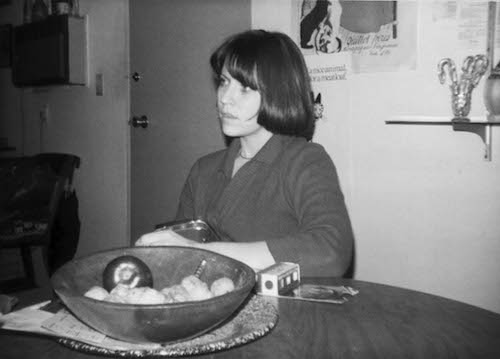
Rachel was the charismatic nucleus of this group. We often met at her apartment near the college. There would always be beer in the refrigerator, Bryan Ferry or The Cars on the stereo, poems to talk about, cigarettes to smoke. And as Rachel was an ardent student of the occult, Tarot cards or palms to read, I Ching coins to throw. And even a Magic 8 Ball to ask all our important questions about love and fame. If we didn’t get the answer we wanted, we’d keep turning it over until we did. Dark-haired, attractive, and confident in her body, Rachel commanded attention. Men, as well as women, were attracted to her, wanted to be around her. She was a bit wild, I suppose, what most people would call “the life of the party.” But it was more than that. Rachel moved and spoke with authority—she wasn’t at all hesitant about expressing her opinions. When it came to literature and films and art, she was passionately intelligent. She’d studied abroad for a year at St. David’s University College in Wales, where she’d fallen in love with the Romantics. There was a poster of Byron above the couch in her living room. Art Nouveau posters of sensuous women draped in cascades of hair. Makeshift bookshelves. A candle in a wine bottle.
Maybe it’s because I was young and messed up emotionally, but the seventies was an extremely chaotic decade. Everyone (that I knew, at any rate) was getting drunk and high, having lots of sex. Hedonism was the norm. It seems fitting—and I’m not quite sure why—that Rachel and I should bond during the later half of this decade. This is in retrospect, mind you. We were young and things were happening to us; I don’t think either of us could step back and see ourselves objectively. Perhaps our poems were an attempt to do that. Or not. I don’t know. But I do know that it was our poems that brought us together. I think we recognized in each other not only talent, but also a determination to succeed. We both wanted to be poets, and wanted this more than anything else. The others in our group, though some had just as much talent, would make different life choices. But Rachel and I had the ambition bug. One semester she and I organized the student poetry reading. Afterwards, there was a party at Rachel’s apartment. I remember facing her in the kitchen. We looked at each other and smiled, then spontaneously hugged—the reading had gone so well. On November 29, 1978, Rachel and I, representing Angel’s Flight, read poems live on the air at KCSN, the radio station at Cal State Northridge. We were being poets. It was very exciting.
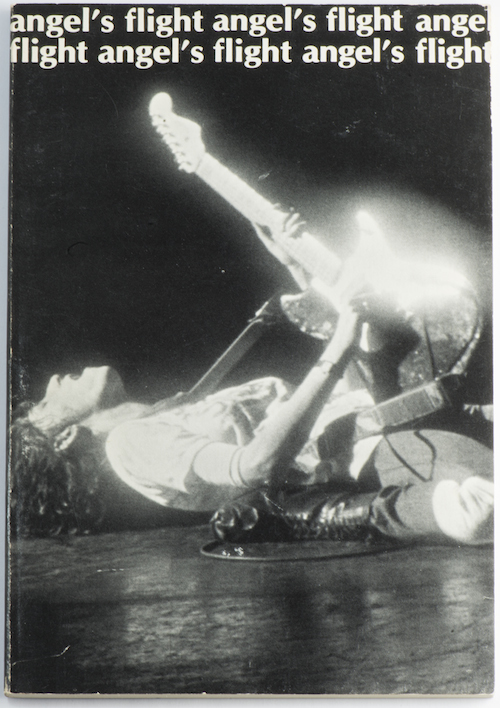
As our friendship grew, so did my admiration for her poems. They tended to be on the short side—she packed a lot of linguistic and emotional power into them, and they had vivid images: “This winter evening / the sky cracks with cardinal color” (she loved describing the sky); “moonlight like yellowed keys / on his antique piano / music across the water our song” (she liked forlornness, too). Rachel was painfully attuned to the violent and tragic side of life. She flirted with despair like a suitor. Self-consciously theatrical, with a sardonic edge, her poems capture the romantic drama she played out, that was just about all played out—her tumultuous lifestyle was beginning to weary her. “This is what it’s like,” she writes in “The Usual,” “the young man involved breaks her tired heart / it’s the usual: spilt liquor, / broken dishes, wrecked cars.” The poems also reveal her tenderness, sexual desire, and longing for children:
In early morning when the sun
is vague and birds are furious
names of children float
like smoke through the empty room:
Ariadne, dark as seal skin
Ian, fair-skinned baby
Marina Terrence Alex John
Rachel was convinced that she was going to die young. By age twenty-five. She’d foreseen it in her palm, in her horoscope. She told me this several times. Told other of our friends. Even told my sister Jennifer. And wrote about it in her journal. And her poems. One of them, “Premonition,” envisions an automobile accident. “I’ll write about you,” I told her. (I don’t know why I said this: I wasn’t certain that I wanted to see thirty. I told you I was messed up.) “Will you do me justice?” she asked. I could tell from her tone, from the way she looked at me, that she meant it as a challenge.
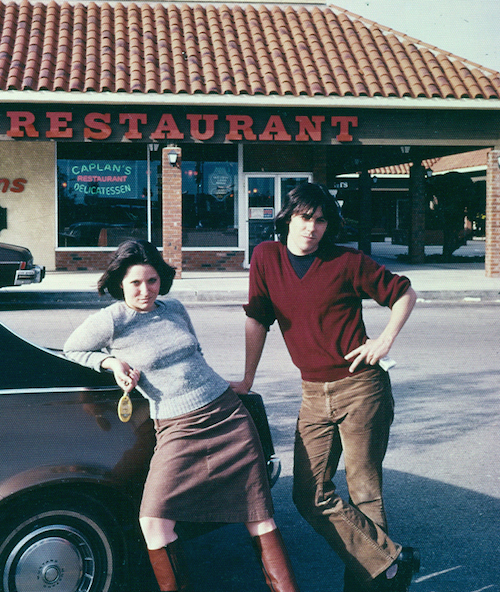
There was a period in which Rachel and I thought we were in love with each other. She admitted as much to me in a letter. But as I was a confirmed homosexual, the most we were able to be was close friends. I watched her go through a few boyfriends. One affair ended badly, dramatically. She suffered through an ectopic pregnancy. Men consistently let her down. I felt at times that I, too, failed her. If only I were straight. . . . She was easily dissatisfied. And sometimes she was bored:
cigarettes dissolve
to blue threads and ash
but the sun continues
in constant repetition
of its slow and rather boring dance.
There was every reason to believe that more was ahead. Rachel and I had started to publish our poems in magazines. We were both included in the summer 1979 issue of Beyond Baroque. Earlier in the year, we’d read together at George Sand Bookstore in Los Angeles. Rachel was now pursuing a graduate degree and teaching English composition at Northridge. I decided not to get a master’s; I’d had enough school. I was in limbo, trying to figure out what to do next. Rachel and I were twenty-five.
On the fourth of July, Rachel, her boyfriend Chris, and I, looking for fireworks, ended up at Chatsworth Park, where we drank and smoked pot with a group of people we met there, and climbed high into the rocks. I barely remember this part of it (I almost never smoked grass). But I do remember calling to Rachel in the dark. We left the park quite late, stopped at a 7-11 to buy more beer, and were heading to the house of one of the people we’d met to continue partying. And so we were driving east on Devonshire Street a few minutes after 2:00 a.m. We were in Rachel’s car. She was driving, Chris was in the passenger seat (nodding off), and I was sitting in the middle of the backseat. I saw the headlights coming toward us, cried out to Rachel, and started to reach for the steering wheel. Blackness.
The sound of beeping woke me (it was a respirator beside my bed in intensive care); figures were moving about in a bluish light. Then blackness again. I was a scarecrow falling down the side of a mountain, bouncing from rock to rock. I opened my eyes. Two doctors were standing at the foot of the bed. One of them said to the other: “You’ll only see this kind of response in someone this young.” Gradually, I became more conscious. My sister Jennifer was allowed to visit (actually she’d been designated the one to tell me). With a pencil I wrote (I couldn’t talk, there was a tube down my throat) “Rachel?” Jennifer recently told me she considers this the most difficult moment of her life.
A drunk driver speeding west on Devonshire had passed out and swerved into our lane, hitting us head-on. He was killed. Chris basically walked away from the accident with a broken arm. Rachel was announced dead on arrival at the hospital. My most serious injuries were a ruptured spleen (which was immediately removed) and a ruptured bronchus, “a passage of airway in the respiratory tract that conducts air into the lungs.” (I often joke about cribbing text from Wikipedia; this time it’s not at all amusing.) My left lung was collapsed, my left pelvis fractured, and my left tibia “snapped like a branch.” Rachel’s bucket seat had crushed my left side.
There were many eerie coincidences around the accident. Shortly after I was moved out of intensive care, a nurse handed me a note. “Rachel called.” (The wife of the man who hit us, it turned out, was also named Rachel; her husband wasn’t insured and she was worried that there would be a lawsuit.) At first the doctors were hesitant to give me anything stronger than Extra-Strength Tylenol—so precarious was my condition. It didn’t matter: I was too banged up to really feel much pain. Unbelievably, a member of our college group came in and took pictures of me in my hospital bed. I never asked her why she took them—even when, later, she gave me copies. People brought me books I couldn’t look at. One was by James Thurber—a well-wisher thought it would “cheer me up.”

I was in the hospital for two months (much of that time in traction), then on crutches for six. When I got out, it seemed as if everyone had done their mourning and moved on. But my mourning hadn’t even begun. I felt very alone, for a very long time, with a grief I was unable to understand or handle: it was too enormous. People said things like “it was her time” and “you must go on” and “good always comes from bad.” A few months later, Dennis Cooper, a young poet I knew of and admired, contacted me. He’d read our poems in Beyond Baroque magazine, had heard about the accident, wanted to publish me in an anthology of poets in their twenties. He sought me out at a reading (a tribute to Rachel; I hobbled to the podium on crutches), said he wanted to be friends. If good always comes from bad, then Dennis appearing when he did, offering his friendship, was the good that came from the accident. His friendship would have a profound effect on my writing and my life.
Eventually I received an insurance settlement of $25,000.00. I didn’t like this money—it had Rachel’s blood on it. I used some of it to buy a car (which I couldn’t drive without having severe panic attacks). Inspired by Dennis’s Little Caesar Press, I decided to use the rest of the money to found a press of my own. Sherwood Press, in Rachel’s honor. Dennis tutored me on typesetting and paste-up, printing and distribution. My first project was a book of Rachel’s poems. I didn’t know how to grieve, but this was one thing that I could do, that I had to do: look after her poems. A chaotic, coffee- and wine-stained bundle—I would retype them, give them order. She’d left her final poem, “The World in the Evening,” unfinished. It was beautiful, one of her best. It opens with a sense of what she was feeling that July:
As this suburban summer wanders toward dark
cats watch from their driveways—they are bored
and await miracles. The houses show, through windows
flashes of knife and fork, the blue light
of televisions . . .
Boys, playing war games, “mimic the ancient news of the world” as girls ride by “in the last pieces of light”:
the color of the sky makes brilliant reflection
in the water and oil along the curb
deepened aqua and the sharp pure rose of the clouds
I never told anyone that I finished Rachel’s last poem for her: rewrote a few phrases she was having trouble with, fixed some punctuation. Nothing major. She’d almost completed it:
there—a woman in a window washes a glass
a man across the street laughs through an open door
utterly alien, alone. There is a time, seconds between
the last light and the dark stretch ahead, when color
is lost—the girl on her swing becomes a swift
apparition, black and white flowing suddenly into night.
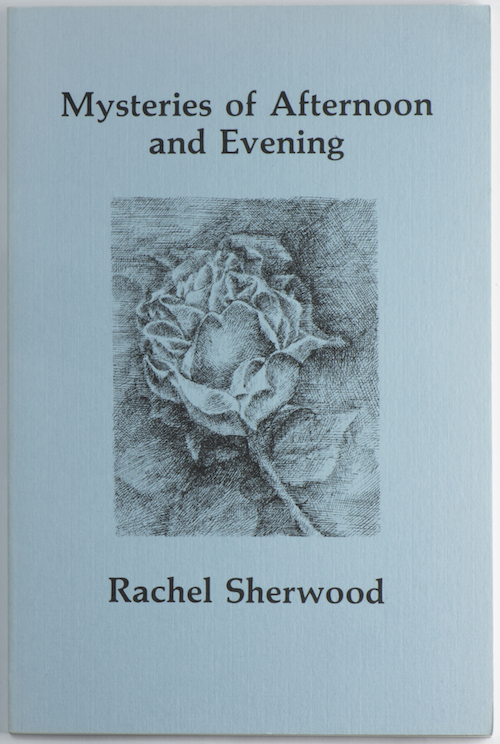
I published Mysteries of Afternoon and Evening in 1981 (in conjunction with Greg Boyd’s Yarmouth Press; Greg had also been a friend of Rachel’s). On April 26, a brief review by Peter Clothier ran in the Los Angeles Times Book Review. The book revealed, he said,
the attentive eye and sharp ear for language of a young poet whose promise will sadly never be fulfilled. She died in an automobile accident nearly two years ago. The prescience of her vision is disquietingly accurate in several of these poems, whose weaknesses reflect only the short time she was permitted to develop her growing talents. The book is a moving tribute to a clear-sighted and caringly human sensibility.
New Age, a mainstream magazine (it was on a review list that Dennis had given me), reprinted Rachel’s poem “Occupation.” Bittersweet: the widest audience her work would reach.
Occupation
The man who told me about war
said, it’s the only thing
that keeps us busy.
I thought of your fingers
on my back
counting the vertebrae
one by one.The only thing?
I became interested in making chapbooks, which weren’t as prevalent then as they are now—they were objets. From 1981 to 1984, I published five chapbooks by poets I liked: Tim Dlugos, Amy Gerstler, Dennis, Bob Flanagan, Alice Notley. And then the “blood money” ran out. I turned thirty, got sober, and eventually moved to New York.
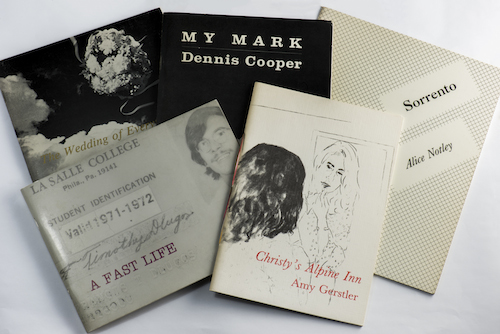
I never thought I’d be able to write about Rachel or the accident—it was just too painful. In 1999, however, a few months shy of the twentieth anniversary of her death, I did. It took me six weeks to write “A Poet’s Death,” a crown of eight linked sonnets. The experience of revisiting the past in these sonnets wasn’t terribly upsetting—on the surface. I had to condense the whole story into eight tight little boxes; the rhymes and ten-syllable lines kept me preoccupied, kept the deeper feelings at bay. Still, I realized how important it was that I was finally addressing it. After the poem was completed, I asked myself, my therapist, and a friend from the old days who’d known her, whether I’d done Rachel justice. If this was all I ever wrote about her, would it be enough?
I didn’t normally submit my work to The American Poetry Review (too conspicuous), but in this case I felt driven to: I wanted people to see this poem. Thanks to Ethel Rackin, a young poet I’d met when I did a visiting stint at Bard College, the poem was accepted and published in their January/February 2000 issue. It happened relatively fast. I’d never been published in APR; friends who had been told me they’d waited years between acceptance and publication. So I was prepared for a long wait. Yet here it suddenly was, in my hands. I was moved. Rachel had stepped into the new century. It wasn’t that the poem brought her back to life, exactly (the title is, after all, “A Poet’s Death”), but that it validated her existence. And hopefully did her justice. Every night, in my loft on the corner of West Broadway and Spring, I’d read and reread the poem in my contributor’s copy, then lie on a slant board and listen to Annie Lennox sing “I Saved the World Today” (over and over) and weep. Weep for a good half hour, until I was exhausted. Then I’d crawl into bed and fall immediately to sleep. This went on for about two weeks. Then, as they say, life went on. Rachel has seemed less “with me” since then.
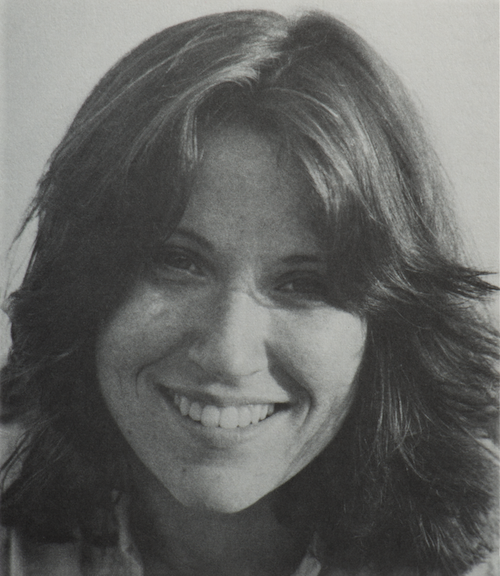
I have some photographs of her. And one of her books—English Romantic Writers—full of her annotations and coffee stains. (The phrase “a Poet’s death,” by the way, is in the last line of Keats’s “After Dark Vapours.” Rachel underlined it three times, which is why I took it for the title of my sonnet crown.) And her poems. And her voice, which I’ve preserved all these years. On November 29, 1978, when we read our poems on the radio, my sister recorded it on 8-track tape. I later transferred it to cassette, then to CD, then to MP3. A few days ago, Nuria Sheehan (at the Poetry Foundation) graciously helped me upload it to SoundCloud.
Perfect: now the sound of Rachel’s voice is in the clouds. To those who choose to listen to the recording, I’m tempted to apologize for my youthful poems. But what can I do—I was young. When I listened to it the other day, I was startled to hear myself say (in “Wedding Night”): “and you’re on the road / being blinded by the headlights / of a speeding car.” I’d forgotten those lines. I wrote the poem the year before I met Rachel. There’s prescience in my poems, too, I guess. The aura around us was certainly charged.
In some way, my career as a poet has been a penance to Rachel. We were going to be poets together. But she wasn’t “permitted to develop her growing talents.” So in a sense I’ve been doing it for the both of us. For many years I thought I needed to be free of her, or at least the pain associated with her, in order to be fully present and functional in my life. Now I see she’s as much a part of me as all the people and things I’ve loved. I see how significant it was that I published a book by a dead friend before I published one of my own, how that conditioned me for future similar projects: posthumous books by Tim Dlugos and Ann Stanford. It’s second nature to me. And why wouldn’t I strive to keep the poems of my dead friends in the world—keeping their work alive is keeping them alive. Isn’t that why we write?
David Trinidad is the author of more than a dozen books, including Peyton Place: A Haiku Soap Opera ...
Read Full Biography

